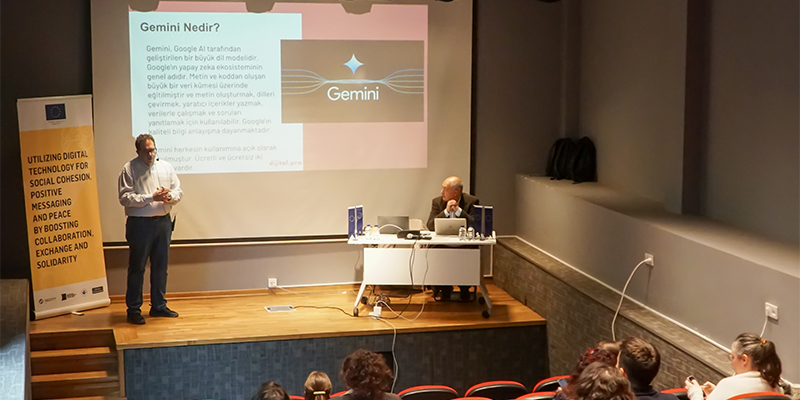As a part of the workshop series within the scope of the project “Utilizing Digital Technology for Social Cohesion, Positive Messaging and Peace by Boosting Collaboration, Exchange and Solidarity”, the seventh workshop, “Civil Society and Artificial Intelligence Workshop”, took place on Monday and Tuesday, April 29-30, 2024. The workshop facilitated by Özgür Mehmet Kütküt and Özgür Kurtuluş was held at the Hrant Dink Foundation with participants from various civil society organizations.
In the first part of the workshop, which aimed to increase the AI literacy of civil society employees, fundamental concepts and current application areas of AI were discussed. Özgür Kurtuluş, who provided information on the historical background of this technology, which is now utilized in almost every sector, noted that rapid developments in the field of AI are increasing competition in different sectors. During the workshop, it was emphasized that the 'narrow AI' technology, which focuses on specific systems, is advancing rapidly as it approaches the 'general AI' category with developments in the field of 'generative AI.' It was also noted that using personal and institutional information to feed AI systems could lead to security vulnerabilities and legal issues. Additionally, the workshop facilitators stated that civil society has a role in ensuring that AI is fed with clean, fair, and non-discriminatory data sets. They concluded the first day of the workshop by discussing the areas in which AI tools can be used to increase efficiency in civil society organizations.
On the second day of the workshop, the discussion focused on 'prompts', which are the instructions given to generative AI systems to perform a specific task. Özgür Mehmet Kütküt emphasized the importance of clearly defining the target audience, objectives, and context, and provided participants with tips on writing good and effective prompts. This session also covered the social impacts of AI, the potential legal and ethical issues arising from the use of new technologies like deep fakes, and the relationship between AI and individual freedoms and privacy. The training concluded with practical demonstrations of various AI tools.

This project is financed by the European Union.


